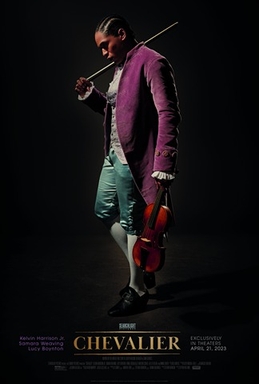In the rush to feature more "hidden figures" from world history, sometimes the subject him/herself can be interesting but his/her story ends up so dull as to wonder why anyone bothered to tell it. Such is the case with Chevalier, a biopic that takes what should be a tale brimming with fire and music and ends up discordant.
Joseph Bologne (Kelvin Harrison, Jr.) is the biracial child (mulatto, in the terms of the day) of a French plantation owner and one of his slaves. Whether it was a genuine love match or something else Chevalier does not answer.
Truth be told, Chevalier does not answer more than a few questions, but I digress.
Bologne, despite the overt racism he faces in Ancien Regime France, becomes besties with Queen Marie Antoinette (Lucy Boynton). He also rises to not just being a master swordsman, composer and violinist (Chevalier begins with him besting none other than Mozart in a fiddle duel). His skills have earned him the rank of Chevalier.
As the Chevalier de Saint-Georges, Joseph continues to fight racism while having an affair with Marie-Josephine, Marquess de Montalembert (Samara Weaving). Her husband the Marquis (Marton Csokas) is displeased enough that his wife has taken to the stage. Her infidelity with a mulatto compounds the scandal. As the French Revolution gears up, the Chevalier de Saint-Georges composes stirring music for the revolution as he faces down both the Queen and the Marquis.
I am predisposed towards costume pictures and historical dramas, so Chevalier would normally have been something right up my street. Why then did the film leave me cold? I think it started at the very beginning, when Joseph, cocky and self-assured, insists on a musical duel with Mozart. Screenwriter Stefani Robinson and director Stephen Williams were clearly aiming to say that this figure was more than Mozart's equal, but his superior.That is a pretty bold opening declaration, one that not backed up by anything in Chevalier. If, say, the film had ended or even had as its midpoint this version of The Devil Went Down to Paris, we could have had a climatic, triumphant film. We would have seen Saint-Georges compose, create, shape his music to rival that of Mozart or another musical rival, Christoph Gluck (Henry Lloyd-Hughes). Instead, Chevalier tells us right from the get-go, "THIS man is a musical GENIUS!" without giving us evidence of such.
As a side note, if Wikipedia is to be believed, Saint-Georges and Gluck were on friendly terms. I can cut Chevalier some slack in that we needed drama, but it was a lost opportunity to not have their rival music play against each other.
I presume Chevalier does give us selections from the surviving works of Saint-Georges (the film tells us that Napoleon's restoring slavery and suppressing Saint-Georges' works caused many of his pieces to be lost). The unfortunate thing is that what pieces of Saint-Georges' works were used were essentially drowned by Kris Bowers' own score. Bowers' score, in and of itself, is fine. However, since people are not familiar with Saint-Georges' music, one would not know which pieces are his and which pieces are Bowers.
Compounding this issue is what is meant as the climax of Chevalier: the concert to fund the French Revolution that so outraged Her Majesty and the Marquis. I freely admit that I am not an expert on classical music, but as I heard the music being performed, I said to myself, "this is too contemporary". The music being played simply did not sound like it came from the era. It sounded as if it was something written today.
While not an exact parallel, it would be similar to trying to pass off Stravinsky as Tchaikovsky. Just as it would be laughable to have Philip Glass-like music and try to make it the score for a Bach biopic, so Bowers' Chevalier score sounds too at odds with the Saint-Georges era to be close to the original.
We rarely see Joseph create music. Instead, we see him get hit on by opera diva La Guimard (Minnie Driver), delve into his liaisons with the marquess and forever face opposition due to his race. It is hard to make the case that the Chevalier de Saint-Georges was in Mozart's league when we don't hear the music, let alone see him write it.
Other elements just jump without much if any rhyme or reason. We go from him besting the King's swordsman (and as side note, we never see him take up his sword again) to being the most intimate of Marie Antoinette's courtiers. How this happened is anyone's guess.
The best performance was Harrison, Jr.'s as the Chevalier de Saint-Georges, but even his felt tapered down a bit. He has a few moments where he shows vulnerability, even regret. It's unfortunate however that more focus was put on his dalliances with the salon socialites than on Saint-Georges creativity. Other performances were flat. Weaving and Boynton were pretty much floundering, and Csokas was a mustache short of twirling. Driver did her best, but her playing an opera diva brought up memories of The Phantom of the Opera. I liked that performance, but I saw that as deliberately over-the-top. Here, it's just over-the-top.
Chevalier, to be fair, has pretty costumes.
If more people seek out the surviving works of Joseph Bologne, Chevalier de Saint-Georges thanks to Chevalier, it has done a good. I've heard it, and it sounds delightful. His life story is a fascinating one. Hopefully we'll get a good film version of it.
 |
| 1745-1799 |



No comments:
Post a Comment
Views are always welcome, but I would ask that no vulgarity be used. Any posts that contain foul language or are bigoted in any way will not be posted.
Thank you.